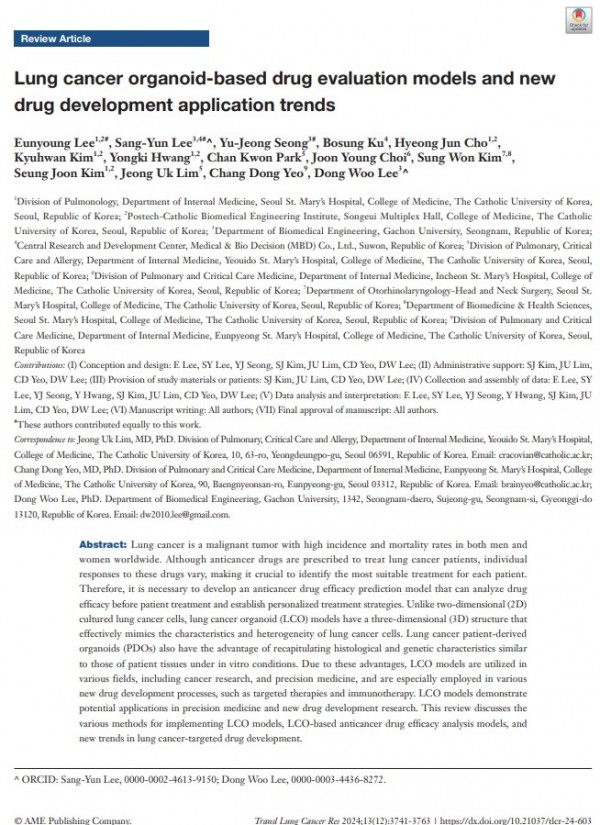논문 2024, Translational Lung Cancer Research, Lung cancer organoid-based …
페이지 정보

본문
Abstract: Lung cancer is a malignant tumor with high incidence and mortality rates in both men and
women worldwide. Although anticancer drugs are prescribed to treat lung cancer patients, individual
responses to these drugs vary, making it crucial to identify the most suitable treatment for each patient.
Therefore, it is necessary to develop an anticancer drug efficacy prediction model that can analyze drug
efficacy before patient treatment and establish personalized treatment strategies. Unlike two-dimensional (2D)
cultured lung cancer cells, lung cancer organoid (LCO) models have a three-dimensional (3D) structure that
effectively mimics the characteristics and heterogeneity of lung cancer cells. Lung cancer patient-derived
organoids (PDOs) also have the advantage of recapitulating histological and genetic characteristics similar
to those of patient tissues under in vitro conditions. Due to these advantages, LCO models are utilized in
various fields, including cancer research, and precision medicine, and are especially employed in various
new drug development processes, such as targeted therapies and immunotherapy. LCO models demonstrate
potential applications in precision medicine and new drug development research. This review discusses the
various methods for implementing LCO models, LCO-based anticancer drug efficacy analysis models, and
new trends in lung cancer-targeted drug development.
women worldwide. Although anticancer drugs are prescribed to treat lung cancer patients, individual
responses to these drugs vary, making it crucial to identify the most suitable treatment for each patient.
Therefore, it is necessary to develop an anticancer drug efficacy prediction model that can analyze drug
efficacy before patient treatment and establish personalized treatment strategies. Unlike two-dimensional (2D)
cultured lung cancer cells, lung cancer organoid (LCO) models have a three-dimensional (3D) structure that
effectively mimics the characteristics and heterogeneity of lung cancer cells. Lung cancer patient-derived
organoids (PDOs) also have the advantage of recapitulating histological and genetic characteristics similar
to those of patient tissues under in vitro conditions. Due to these advantages, LCO models are utilized in
various fields, including cancer research, and precision medicine, and are especially employed in various
new drug development processes, such as targeted therapies and immunotherapy. LCO models demonstrate
potential applications in precision medicine and new drug development research. This review discusses the
various methods for implementing LCO models, LCO-based anticancer drug efficacy analysis models, and
new trends in lung cancer-targeted drug development.

 2025, Annals of Surgical Oncology, High‑Throughput Chemotherapeutic Drug Screening System for Gastric Cancer (Cure‑GA)
2025, Annals of Surgical Oncology, High‑Throughput Chemotherapeutic Drug Screening System for Gastric Cancer (Cure‑GA) CLIA Lab Validate Letter
CLIA Lab Validate Letter